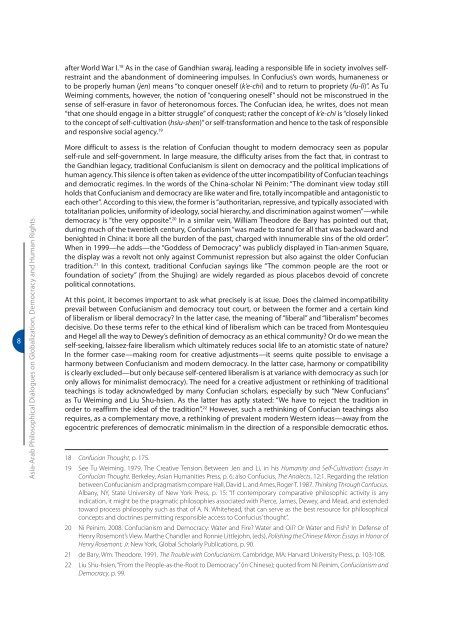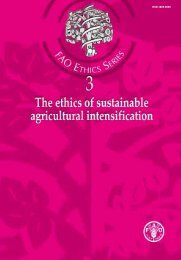Asian-Arab philosophical dialogues on globalization, democracy ...
Asian-Arab philosophical dialogues on globalization, democracy ...
Asian-Arab philosophical dialogues on globalization, democracy ...
Create successful ePaper yourself
Turn your PDF publications into a flip-book with our unique Google optimized e-Paper software.
8<br />
Asia-<str<strong>on</strong>g>Arab</str<strong>on</strong>g> Philosophical Dialogues <strong>on</strong> Globalizati<strong>on</strong>, Democracy and Human Rights<br />
after World War I. 18 As in the case of Gandhian swaraj, leading a resp<strong>on</strong>sible life in society involves selfrestraint<br />
and the aband<strong>on</strong>ment of domineering impulses. In C<strong>on</strong>fucius’s own words, humaneness or<br />
to be properly human (jen) means “to c<strong>on</strong>quer <strong>on</strong>eself (k’e-chi) and to return to propriety (fu-li)”. As Tu<br />
Weiming comments, however, the noti<strong>on</strong> of “c<strong>on</strong>quering <strong>on</strong>eself” should not be misc<strong>on</strong>strued in the<br />
sense of self-erasure in favor of heter<strong>on</strong>omous forces. The C<strong>on</strong>fucian idea, he writes, does not mean<br />
“that <strong>on</strong>e should engage in a bitter struggle” of c<strong>on</strong>quest; rather the c<strong>on</strong>cept of k’e-chi is “closely linked<br />
to the c<strong>on</strong>cept of self-cultivati<strong>on</strong> (hsiu-shen)” or self-transformati<strong>on</strong> and hence to the task of resp<strong>on</strong>sible<br />
and resp<strong>on</strong>sive social agency. 19<br />
More difficult to assess is the relati<strong>on</strong> of C<strong>on</strong>fucian thought to modern <strong>democracy</strong> seen as popular<br />
self-rule and self-government. In large measure, the difficulty arises from the fact that, in c<strong>on</strong>trast to<br />
the Gandhian legacy, traditi<strong>on</strong>al C<strong>on</strong>fucianism is silent <strong>on</strong> <strong>democracy</strong> and the political implicati<strong>on</strong>s of<br />
human agency. This silence is often taken as evidence of the utter incompatibility of C<strong>on</strong>fucian teachings<br />
and democratic regimes. In the words of the China-scholar Ni Peinim: “The dominant view today still<br />
holds that C<strong>on</strong>fucianism and <strong>democracy</strong> are like water and fire, totally incompatible and antag<strong>on</strong>istic to<br />
each other”. According to this view, the former is “authoritarian, repressive, and typically associated with<br />
totalitarian policies, uniformity of ideology, social hierarchy, and discriminati<strong>on</strong> against women”—while<br />
<strong>democracy</strong> is “the very opposite”. 20 In a similar vein, William Theodore de Bary has pointed out that,<br />
during much of the twentieth century, C<strong>on</strong>fucianism “was made to stand for all that was backward and<br />
benighted in China: it bore all the burden of the past, charged with innumerable sins of the old order”.<br />
When in 1999—he adds—the “Goddess of Democracy” was publicly displayed in Tian-anmen Square,<br />
the display was a revolt not <strong>on</strong>ly against Communist repressi<strong>on</strong> but also against the older C<strong>on</strong>fucian<br />
traditi<strong>on</strong>. 21 In this c<strong>on</strong>text, traditi<strong>on</strong>al C<strong>on</strong>fucian sayings like “The comm<strong>on</strong> people are the root or<br />
foundati<strong>on</strong> of society” (from the Shujing) are widely regarded as pious placebos devoid of c<strong>on</strong>crete<br />
political c<strong>on</strong>notati<strong>on</strong>s.<br />
At this point, it becomes important to ask what precisely is at issue. Does the claimed incompatibility<br />
prevail between C<strong>on</strong>fucianism and <strong>democracy</strong> tout court, or between the former and a certain kind<br />
of liberalism or liberal <strong>democracy</strong>? In the latter case, the meaning of “liberal” and “liberalism” becomes<br />
decisive. Do these terms refer to the ethical kind of liberalism which can be traced from M<strong>on</strong>tesquieu<br />
and Hegel all the way to Dewey’s definiti<strong>on</strong> of <strong>democracy</strong> as an ethical community? Or do we mean the<br />
self-seeking, laissez-faire liberalism which ultimately reduces social life to an atomistic state of nature?<br />
In the former case—making room for creative adjustments—it seems quite possible to envisage a<br />
harm<strong>on</strong>y between C<strong>on</strong>fucianism and modern <strong>democracy</strong>. In the latter case, harm<strong>on</strong>y or compatibility<br />
is clearly excluded—but <strong>on</strong>ly because self-centered liberalism is at variance with <strong>democracy</strong> as such (or<br />
<strong>on</strong>ly allows for minimalist <strong>democracy</strong>). The need for a creative adjustment or rethinking of traditi<strong>on</strong>al<br />
teachings is today acknowledged by many C<strong>on</strong>fucian scholars, especially by such “New C<strong>on</strong>fucians”<br />
as Tu Weiming and Liu Shu-hsien. As the latter has aptly stated: “We have to reject the traditi<strong>on</strong> in<br />
order to reaffirm the ideal of the traditi<strong>on</strong>”. 22 However, such a rethinking of C<strong>on</strong>fucian teachings also<br />
requires, as a complementary move, a rethinking of prevalent modern Western ideas—away from the<br />
egocentric preferences of democratic minimalism in the directi<strong>on</strong> of a resp<strong>on</strong>sible democratic ethos.<br />
18 C<strong>on</strong>fucian Thought, p. 175.<br />
19 See Tu Weiming. 1979. The Creative Tensi<strong>on</strong> Between Jen and Li, in his Humanity and Self-Cultivati<strong>on</strong>: Essays in<br />
C<strong>on</strong>fucian Thought. Berkeley, <str<strong>on</strong>g>Asian</str<strong>on</strong>g> Humanities Press, p. 6; also C<strong>on</strong>fucius, The Analects, 12:1. Regarding the relati<strong>on</strong><br />
between C<strong>on</strong>fucianism and pragmatism compare Hall, David L. and Ames, Roger T. 1987. Thinking Through C<strong>on</strong>fucius.<br />
Albany, NY, State University of New York Press, p. 15: “If c<strong>on</strong>temporary comparative philosophic activity is any<br />
indicati<strong>on</strong>, it might be the pragmatic philosophies associated with Pierce, James, Dewey, and Mead, and extended<br />
toward process philosophy such as that of A. N. Whitehead, that can serve as the best resource for <str<strong>on</strong>g>philosophical</str<strong>on</strong>g><br />
c<strong>on</strong>cepts and doctrines permitting resp<strong>on</strong>sible access to C<strong>on</strong>fucius’ thought”.<br />
20 Ni Peinim. 2008. C<strong>on</strong>fucianism and Democracy: Water and Fire? Water and Oil? Or Water and Fish? In Defense of<br />
Henry Rosem<strong>on</strong>t’s View. Marthe Chandler and R<strong>on</strong>nie Littlejohn, (eds), Polishing the Chinese Mirror: Essays in H<strong>on</strong>or of<br />
Henry Rosem<strong>on</strong>t, Jr. New York, Global Scholarly Publicati<strong>on</strong>s, p. 90.<br />
21 de Bary, Wm. Theodore. 1991. The Trouble with C<strong>on</strong>fucianism. Cambridge, MA: Harvard University Press, p. 103-108.<br />
22 Liu Shu-hsien, “From the People-as-the-Root to Democracy” (in Chinese); quoted from Ni Peinim, C<strong>on</strong>fucianism and<br />
Democracy, p. 99.

















